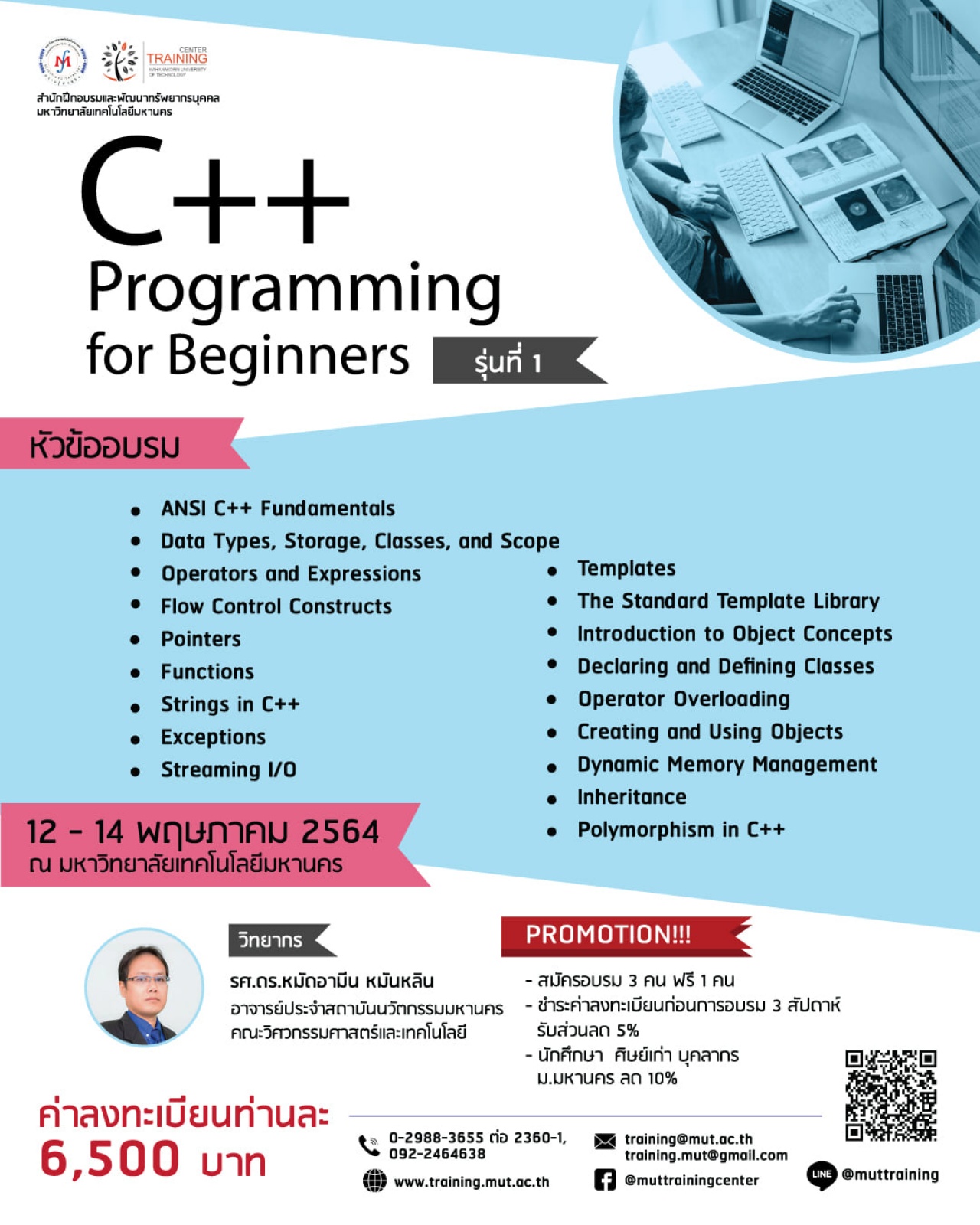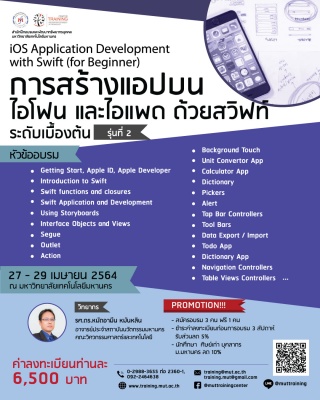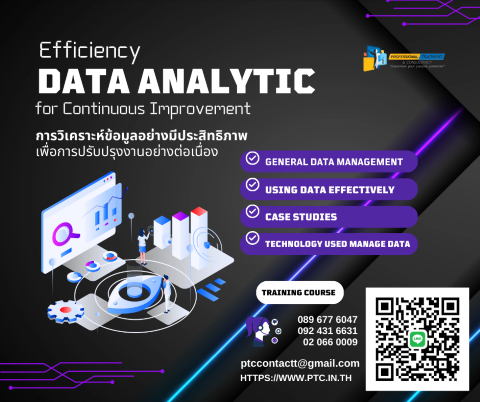โครงการอบรม C++ Programming for Beginners รุ่นที่ 1

ข้อมูลติดต่อ
- ชื่อวิทยากร/หน่วยงาน/บริษัท: สำนักฝึกอบรมมหาวิทยาลัยเทคโนโลยีมหานคร
- ชื่อผู้ติดต่อ: สำนักฝึกอบรมมหาวิทยาลัยเทคโนโลยีมหานคร
- เบอร์มือถือ: 092 246-4638
- เบอร์โทรอื่นๆ: -
- อีเมล: training.mut@gmail.com
- เว็บไซต์: https://www.facebook.com/สำนักฝึกอบรม ม.เทคโนโลยีมหานคร
- LINE Id: @muttraining
รายละเอียด คอร์สอบรม
หลักการและเหตุผล
หลักสูตรการเขียนโปรแกรมด้วย C++ เป็นหลักสูตรที่เหมาะสำหรับผู้ที่ต้องการเริ่มต้นศึกษาเกี่ยวกับการเขียนโปรแกรมด้วยคุณสมบัติของตัวภาษา C++ ที่สามารถทำงานได้ทั้งในรูปแบบฟังก์ชัน สำหรับการเริ่มต้นในการเขียนโปรแกรม และยังสามารถทำงานในรูปแบบของการเขียนโปรแกรมเชิงวัตถุ (Object-Oriented Programming) ซึ่งเป็นพื้นฐานสำหรับการเขียนโปรแกรมอื่นๆ เช่น Java, Visual C#, Visual C++
หลักสูตร C++ จึงสามารถเรียนได้ทั้งผู้ที่ไม่เคยเขียนโปรแกรมมาก่อน หรือผู้ที่เคยเขียนโปรแกรมด้วยภาษา C มาแล้ว และต้องการศึกษาเพิ่มเติมในส่วนที่เกี่ยวกับการเขียนโปรแกรมเชิงวัตถุ ภาษา C++ จึงเหมาะสมกับการศึกษาด้านการเขียนโปรแกรมในทุกระดับ
ผู้เรียนจะได้เรียนรู้ถึงการกำหนดตัวแปร ฟังก์ชัน คลาส ออปเจกต์ และคุณสมบัติอื่นๆ ของการเขียนโปรแกรมเชิงวัตถุ ซึ่งประกอบไปด้วย Encapsulation, Polymorphism และ Inheritance รวมถึงคุณสมบัติอื่นๆ ที่มีอยู่ใน C++ เช่น Multiple Inheritance, Template, Standard Template Library เป็นต้น
วัตถุประสงค์
1. เพื่อให้ผู้เข้าอบรม ได้มีความรู้ความเข้าใจในการเขียนโปรแกรมภาษา C++
2. เพื่อให้ผู้เข้าอบรม ได้ฝึกปฏิบัติและสามารถนำไปประยุกต์ใช้งานได้จริง
3. เพื่อให้ผู้เข้าอบรม มีความรู้ในการเขียนโปรแกรมอื่นได้
หัวข้อการฝีกอบรม
วันที่ 1 :
1. ANSI C++ Fundamentals
• Block Structure of C++ Programs
• Fundamentals of Syntax
• Built in Data Types
• The Preprocessor and Macros
• Standard Runtime Libraries and Header Files
• Organizing C++ Source Files
• Integrating C and C++ Projects
• Using C in C++
2. Data Types, Storage, Classes, and Scope
• Data Types and Qualifiers
• Constants and String Literals
• Static versus Automatic Storage
• Scope and Variables
• Initialization and Assignment
• Enumerated Types
• The bool Type
• Constant Storage
• Pointers to Constant Storage
• Constant Pointers
• References
• Constant Reference Arguments
• Volatile Data
• Global Data
3. Operators and Expressions
• Arithmetic, Logical, and Bit Operators
• Precedence and Associativity Assignment
• Type Conversion Rules
• Type Casting
4. Flow Control Constructs
• Conditional Constructs: if, switch
• Looping Constructs: while, do, for
• Programming Style
5. Pointers
• Advantages of Pointers
• Uses of Pointers
• Declaring Pointers
• Pointer and Address Arithmetic
• Initializing and Dereferencing Pointers
• Pointers versus Arrays
6. Functions
• Purpose of Functions
• Functions versus Inlining
• The Argument Stack
• Passing by Value
• Passing by Reference
• Declaring External Functions
• Function Prototypes and Type Checking
• Default Function Data Types
• Function Overloading
• Problems with Function Overloading
• Name Resolution
• Promotions and Conversions
• Call by Value
• Reference Declarations
• Call-by-Reference and Reference Types
• References in Function Return
• Constant Argument Types
• Conversion of Parameters Using Default Initializers
• Providing Default Arguments
• Inline Functions
วันที่ 2 :
7. Strings in C++
• Character Strings
• The String Class
• Operators on Strings
• Member Functions of the String Class
8. Exceptions
• Types of Exceptions
• Trapping and Handling Exceptions
• Triggering Exceptions
• Handling Memory Allocation Errors
9. Streaming I/O
• Streams and the iostream library
• Built-in Stream Objects
• Stream Manipulators
• Stream Methods
• Input/Output Operators
• Character Input
• String Streams
• Formatted I/O
• File Stream I/O
• Overloading Stream Operators
• Persistent Objects
10. Templates
• Purpose of Template Classes
• Constants in Templates
• Templates and Inheritance
• Container Classes
• Use of Libraries
11. The Standard Template Library
• STL Containers
• Parameters Used in Container Classes
• The Vector Class
• STL Algorothms
• Use of Libraries
12. Introduction to Object Concepts
• The Object Programming Paradigm
• Object-Orientated Programming Definitions
• Information Hiding and Encapsulation
• Separating Interface and Implementation
• Classes and Instances of Objects
• Overloaded Objects and Polymorphism
วันที่ 3 :
13. Declaring and Defining Classes
• Components of a Class
• Class Structure
• Class Declaration Syntax
• Member Data
• Built-in Operations
• Constructors and Initialization
• Initialization vs. Assignment
• Class Type Members
• Member Functions and Member Accessibility
• Inline Member Functions
• Friend Functions
• Static Members
• Modifying Access with a Friend Class
14. Operator Overloading
• Advantages and Pitfalls of Overloading
• Member Operator Syntax and Examples
• Class Assignment Operators
• Class Equality Operators
• Non-Member Operator Overloading
• Member and Non-Member Operator Functions
• Operator Precedence
• The this Pointer
• Overloading the Assignment Operator
• Overloading Caveats
15. Creating and Using Objects
• Creating Automatic Objects
• Creating Dynamic Objects
• Calling Object Methods
• Constructors
• Initializing Member consts
• Initializer List Syntax
• Allocating Resources in Constructor
• Destructors
• Block and Function Scope
• File and Global Scope
• Class Scope
• Scope Resolution Operator
• Using Objects as Arguments
• Objects as Function Return Values
• Constant Methods
• Object Copying and Copy Constructor
• Automatic Copy Constructor
• Conversion Constructor
16. Dynamic Memory Management
• Advantages of Dynamic Memory Allocation
• Static, Automatic, and Heap Memory
• Free Store Allocation with new and delete
• Handling Memory Allocation Errors
17. Inheritance
• Inheritance and Reuse
• Composition vs. Inheritance
• Inheritance: Centralized Code
• Inheritance: Maintenance and Revision
• Public, Private and Protected Members
• Redefining Behavior in Derived Classes
• Designing Extensible Software Systems
• Syntax for Public Inheritance
• Use of Common Pointers
• Constructors and Initialization
• Inherited Copy Constructors
• Destructors and Inheritance
• Public, Protected, Private Inheritance
18. Polymorphism in C++
• Definition of Polymorphism
• Calling Overridden Methods
• Accessing Overridden Methods
• Virtual Methods and Dynamic Binding
• Virtual Destructors
• Abstract Base Classes and Pure Virtual Methods
คุณสมบัติผู้เข้าอบรม
1. ผู้ที่ต้องการเริ่มต้นเขียนโปรแกรมด้วยคุณบัติของภาษา C++
2. ผู้ที่สนใจนำความรู้ไปเขียนโปรแกรมอื่นๆ ต่อไป
รูปแบบการอบรม
บรรยาย+ฝึกปฎิบัติ
วันที่รับสมัคร
01/01/2564 - 26/04/2564
ข้อมูลวันที่อบรม
ลำดับ วันที่อบรม สถานที่อบรม เวลาอบรมบรรยาย เวลาอบรมปฏิบัติ
1. 12/05/2564 - 14/05/2564 มหาวิทยาลัยเทคโนโลยีมหานคร 18 ชม. 18 ชม.
ค่าใช้จ่าย
6,500.00 บาท
โปรโมชั่น
1.สมัครอบรม 3 ท่าน ฟรี 1 ท่าน
2.ชำระค่าลงทะเบียนก่อนการอบรม 3 สัปดาห์ ลด 5%
3.ศิษย์เก่า นักศึกษาและบุคลากร รับส่วนลด 10%
ชวนอ่าน ! เทรนด์ใหม่ ๆ เพื่อ การพัฒนาตนเอง และเพิ่มศักยภาพ การทำงาน
ตารางเรียน/สถานที่
| รอบ | วันที่ | เวลา | สถานที่ |
|---|---|---|---|
| 1 | พุธที่ 12 พ.ค. 2021 - ศุกร์ที่ 14 พ.ค. 2021 | 09:00 - 16:00 น. | มหาวิทยาลัยเทคโนโลยีมหานคร |
ข้อมูลคอร์ส
- รหัสคอร์สอบรม: ABR-2104-0081
- ประเภทการอบรม: อบรมทั่วไปโดยบริษัท/หน่วยงาน
- หมวดหมู่: คอมพิวเตอร์ ไอที เทคโนโลยี
คุณน่าจะสนใจ

หลักการและเหตุผล การเปิดเสรีกลุ่มประชาคมเศร...
มหาวิทยาลัยเทคโนโลยี...
Excel ในงาน HR และงานธุรการมืออาชีพ...
PTS Training Solutio...






